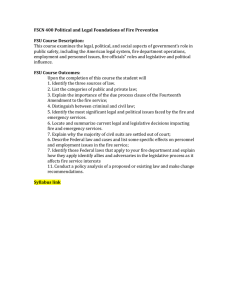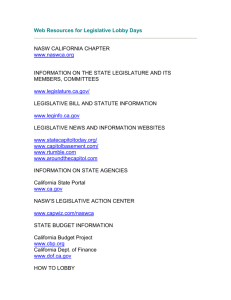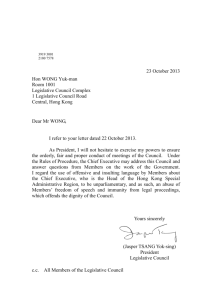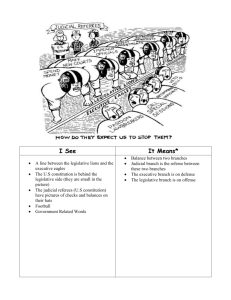THE PAGE PROGRAM Frequently Asked Questions
advertisement
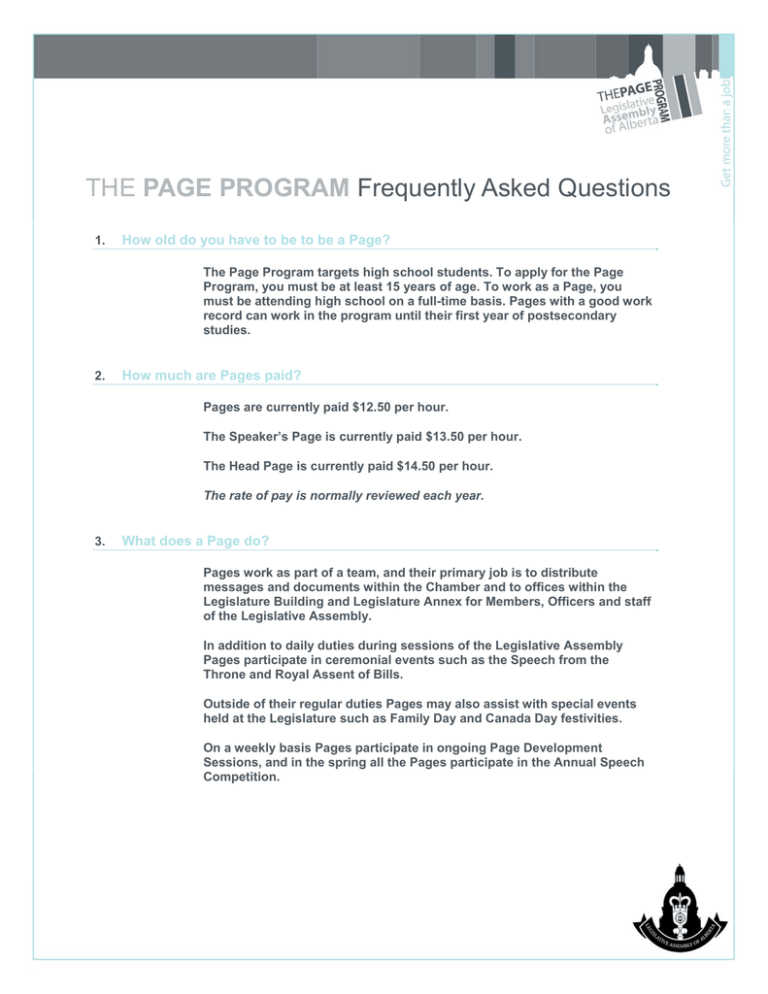
THE PAGE PROGRAM Frequently Asked Questions 1. How old do you have to be to be a Page? The Page Program targets high school students. To apply for the Page Program, you must be at least 15 years of age. To work as a Page, you must be attending high school on a full-time basis. Pages with a good work record can work in the program until their first year of postsecondary studies. 2. How much are Pages paid? Pages are currently paid $12.50 per hour. The Speaker’s Page is currently paid $13.50 per hour. The Head Page is currently paid $14.50 per hour. The rate of pay is normally reviewed each year. 3. What does a Page do? Pages work as part of a team, and their primary job is to distribute messages and documents within the Chamber and to offices within the Legislature Building and Legislature Annex for Members, Officers and staff of the Legislative Assembly. In addition to daily duties during sessions of the Legislative Assembly Pages participate in ceremonial events such as the Speech from the Throne and Royal Assent of Bills. Outside of their regular duties Pages may also assist with special events held at the Legislature such as Family Day and Canada Day festivities. On a weekly basis Pages participate in ongoing Page Development Sessions, and in the spring all the Pages participate in the Annual Speech Competition. 4. What do the Head Page and the Speaker’s Page do? The Head Page and the Speaker’s Page share the same duties as the regular Pages, as well as having some additional administrative responsibilities and assisting with supervision. The Head Page and the Speaker’s Page work as a team, assisting with the co-ordination of work schedules, providing assistance and team leadership to Pages in their daily responsibilities, communicating with the Office of the Sergeant-at-Arms and monitoring supplies. The Head Page assists with the Page interview process each spring. The Speaker’s Page provides additional support to the Speaker during the daily routine of session. The Head and Speaker’s Pages are chosen following a selection process with those who are interested in the positions. 5. Are Pages expected to miss school? During sessions of the Legislative Assembly Pages are scheduled for two to three shifts per week, including afternoons and occasional evening shifts. Afternoon shifts begin at 12:45 p.m. Monday through Thursday. Pages must make arrangements with their school and teachers to keep their studies and assignments up to date while missing afternoon classes; however, in the end it is the student’s responsibility to make up what they missed. Students must include a letter of support from their school as part of their application to be considered for the Page Program. 6. Pages work during session. What and when is that? Session is a series of meetings of the Legislative Assembly, opened by Royal Proclamation and closed by a cabinet order, held in the Chamber within the Legislature Building. Session generally includes spring (typically February to June) and fall (typically October to December) sittings. 7. How is working as a Page different from any other part-time job for students? Being a Page is unique because while you gain work experience, you also learn first-hand how Alberta’s parliament works. Instead of seeing clips of the Legislative Assembly in the news, you get to be part of it. Pages also interact with a variety of people, including Members, Officers and staff of the Legislative Assembly, on a daily basis. As a Page representing the Legislative Assembly, you are expected to demonstrate professional and impartial behaviour in all interactions. Additionally, Pages participate in Page Development Sessions that are focused on skills that can be used now and into the future. 8. What are the Page Program objectives? The Page Program is directed by the Sergeant-at-Arms of the Legislative Assembly Office to provide support to Members and Officers of the Legislative Assembly in the Chamber during sittings of the Legislative Assembly, to assist Legislative Assembly staff in providing services to Members and Officers of the Assembly and the general public, to provide developmental opportunities for Alberta’s high school students, and to promote an understanding of the institution of parliament. 9. What are the Page Development Sessions? Page Development Sessions vary from year to year, often involving guest speakers discussing a range of topics. In the past guest speakers have included the Lieutenant Governor of Alberta, Canadian Members of Parliament and Senators, Members of the Legislative Assembly of Alberta, the Mayor of Edmonton and many others. Popular topics include career journeys and life experiences. Some of the Page Development Sessions are devoted to learning new skills such as communication or team building that Pages are able to use in their work as well as later on in life. 10. What is the Speech Competition, and when is it held? The Speech Competition is a chance for Pages to improve their communication skills by preparing and delivering a four to six-minute speech based on a topic chosen by the Sergeant-at-Arms with input from the Pages. It occurs every spring, usually in May. The Pages attend a development session on public speaking and debate and are then given several weeks to prepare their speech. The speeches are judged by a panel, and the Speaker presents a cash award to the top three and an engraved prize to the winner at a luncheon held for all of the Pages. 11. How do Pages get to work? How do Pages get home? As employees Pages are responsible for providing their own transportation to and from work. To ensure the safety and security of Pages, should you be asked to work in the evenings past 10 p.m., the LAO can provide a taxi to get home if you live in the greater Edmonton area. 12. What do Pages wear in the House? Pages are provided with uniforms, including a suit jacket, four long-sleeved button-up shirts, one cravat, two pairs of pants or two skirts. Black shoes are your responsibility to provide, and we suggest that they be comfortable. Uniforms must be returned when you leave the program. As a Page you are representing the Legislative Assembly; therefore, you must adhere to a high standard of dress and deportment at all times. 13. What are the qualities you look for in a Page? We look for students who are enthusiastic, respectful, discreet and able to work as part of a team and demonstrate strong interpersonal and communication skills. Working as a Page requires a great deal of commitment, so we look for students who are able to commit to the hours of work, balancing the scheduling demands with school work and extracurricular activities. Students applying to the Page Program must be reliable and demonstrate a strong and consistent academic standing. This does not mean that Pages need to be at the top of their class, but your marks and study habits need to be strong enough to withstand the missed time from school. In addition to being strong academically, we look for students who have some work experience and involvement with sports, music, community or volunteer activities. Note that as employees of the Legislative Assembly Office Pages are expected to be apolitical and nonpartisan in all aspects of their duties. 14. Do you have to be bilingual to be a Page? While fluency in a second language is always considered an asset, Pages are not required to be bilingual. 15. Do you have to know about government and politics to be a Page? Coming into the Page Program with an interest in government, politics and parliamentary procedure is helpful; however, Pages receive extensive training in these areas as it pertains to your work. For those interested, visit the Citizen’s Guide and the Dictionary of Parliamentary Terms on the Legislative Assembly of Alberta’s website (www.assembly.ab.ca). 16. What if I do not live in the Edmonton area? Can I still participate in the Page Program? We welcome applications from students throughout Alberta. If you are interested in the Page Program and are a student from outside of Edmonton, you will need to arrange for accommodations. You may also want to look into a school partnership between your home school and a local school to provide continuity in your studies. As these arrangements are the responsibility of the Pages, it is important to discuss the Page Program with your family and your school. 17. What do I gain from working as a Page? The Page Program is more than just a job. It is an opportunity to learn firsthand how Alberta’s parliament works and how laws are passed in the province. While carrying out your duties, you will gain work experience, career insights and learn job-related skills such as communication, problem solving and leadership. 18. How many Pages work at the Legislature? Usually, there are 14 Pages, one Speaker’s Page and one Head Page. There are eight Pages scheduled for each afternoon shift and four to six scheduled for any evening shifts.


